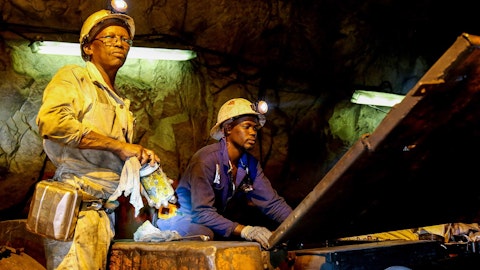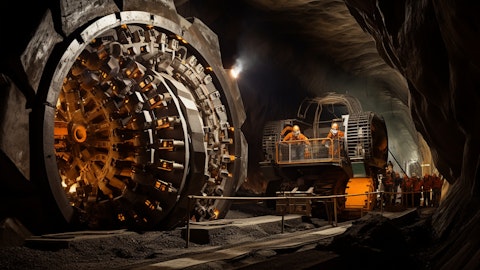And one of the things that I think the United States and Washington DC policymakers have clocked onto is that they could potentially import that intermediate product that we will produce from nodules into the United States for US battery makers to make battery cells. And of course, once you do that, it means the material is in the United States and it will stay here. It will be used to make batteries, but at end of life, it will be recycled. And recycling in decades to come will become a very important part of the supply chain. So the onshore side means there are no limitations to how we scale up the onshore processing. When it comes to the offshore, what we are already doing, as we announced in a previous release, is looking for a second production vessel.
But as we get closer to production, we’re also finding people knocking on our door saying, hey, we have one of those ships exactly like the Hidden Gem, and we’d like to see it busy or we’d like to explore. Could Allseas use it as their production vessel number two? And so think of it as a cookie-cutter approach. But, and that’s how we are going to do the early scale-up towards the NORI-D block. In the future, I think what we’ll have is bigger production platforms as we start to drive costs out of the business, better economics. And the simple math is that we just announced that we are moving the production platform to 3 million tons. There is the possibility of moving production well beyond that, but it would not be with a boat like we have now.
But for the moment, it’s cookie-cutter, put more boats on the water, and it’s tapping into already built, permitted, and financed onshore processing plants in parts of Asia.
Vasu Patel: Sounds good. Thank you so much.
Gerard Barron: Pleasure.
Craig Shesky: And we’re going to move from the phone line to some questions in the chat. Gerard, there’s a question for you specifically the current influence from China on deep-sea mining, as well as the further new five-year agreement between Russia and the ISA. Maybe if you want to comment at all on what you’re seeing from China in terms of on-the-ground negotiations with the International Seabed Authority.
Gerard Barron: Sure. Look, China is, I guess, the most powerful voice at the ISA. And if you listen to Bill Whitaker’s 60 Minute show on, the reason for that is the United States are not there. And what China are doing, which we appreciate, is saying all of the member states have signed on to the convention of the Law of the Sea, and that came with it legal obligations to put in place the exploration and exploitation regulations to allow the development of this industry. No matter which way you look at it, China has the absolute market leadership when it comes to these base metals. And the reason for that is they are very forward-looking, and we could learn a lot from how they deploy capital and how they see demand into the future and do things about it.
And so I think that we are encouraged to see China in the industry. We know they have five contracts. Two of them are in the CCZ, which is where we operate. China wants regulations to be established to protect the environment, and we want them as well. And I think that’s one of the great gifts that come from this legal framework to have a central regulator that represents 168 member countries plus the European Union means that you have a chance of getting it right, because when you outsource mining to developing countries, you are also outsourcing the environmental oversight, and that doesn’t always work out so well. So I think there’s no doubt China already has a position at the table. They are obviously a strong advocate for environmental regulations, and I think we should embrace that and appreciate that they are there supporting the establishment of this industry.
Craig Shesky: Thanks. There’s a question from Tyler MacNeil. Any updates to the DPA Department of Defense Title III grant? Yes, we’ve been in communication. We’ve also been looking very closely at the DoD grant program, and there was nearly $400 million of new funds allocated to it earlier this year. So that process is ongoing. I would say stay tuned on that front. These processes always tend to take a little bit longer than one anticipates, and I think that applies too to the direction from the House Armed Services Committee to the Pentagon to deliver a report on the potential processing and refining of nodules. But frankly, that report, we think is going to be very important to underscore our national security relevance for the United States.
And I think we’re also seeing that it’s really not just about the Department of Defense, DPA Title III program, but increasing focus on nodules from the United States. It also means that there are other more direct forms of potentially getting funding to do similar feasibility work. So rest assured, the TMC is aggressively pursuing all potential opportunities on that front. And it’s really have to do with the fact that I think now there is a growing momentum from the military, political, and intelligence communities. And when you’re talking about hundreds of these former leaders signing on to something that’s really a momentum of its own and showing that a lot of the education frankly, that we’ve been doing, along with other contractors about what this resource is, has been fruitful, and we expect more of it this year.
Also, Gerard a question for you from [Sean Dre] (ph). Certainly, we have a strong partnership with NORI-D. Do we have any other plans in the near future to develop further partnerships with countries? Any other expectations of countries who might want to become sponsoring states? Any focus on us on that front?
Gerard Barron: Look, we are frequently contacted by countries, particularly developing countries, who would like our help or our partnership to help them get into this industry. And at the moment our hands are pretty full. However, we are exploring how we can help some of those nations participate because particularly developing countries who would otherwise not have access to any economic opportunities like this, now is the time for them to participate. So nothing to report. And we do have a laser focus inside the business on our NORI contract area at the moment, of course, and — but there might be something in the future.
Craig Shesky: And the last question that we have time for, from [Tim Panetti] (ph). Do we have any updates in terms of discussions with auto OEMs? And any news on their focus on this new industry?
Gerard Barron: Well, I can confirm that we continue to talk to them, but I don’t think the auto OEMs are going to move until we are closer to production. And quite frankly, our job at the moment is to keep them informed, keep them up to date on the environmental evidence that is coming to hand, and at the right time, we will be a great partner for them, because in the future, of course, between carbon equalization measures and battery passport initiatives, the CO2 footprint is going to be really important. And we know what our CO2 footprint is going to look like. We also know through our lifecycle analysis, what our impacts on other areas will be as well, whether it’s sequestered carbon or water usage, freshwater systems, and so on.
And I think that those matters are going to be really important to measure because when you compare them to alternative supply in the marketplace, they’re going to look really low impact at the bottom end of the scale. And that means that customers will be rewarded for choosing those products over materials that come with a higher impact. So our job is to continue to develop those systems, continue to provide that environmental evidence, which, of course, will make available to the world, but help put it into context as it becomes available for those OEMs. And we’ve got a cordial, respectful relationship, some better than others. But when the time is right, I’m confident that they will be there.
Craig Shesky: Thanks. Look, thanks to everybody for taking the time to join us on the call today, and we are certainly looking forward to sharing more progress on our next quarterly call, which is just right around the corner. And we’ll turn that back over to the operator for any final comments and disconnection.
Operator: Thank you, sir. This concludes today’s conference call. Thank you all for participating. You may all disconnect.
Follow Tmc The Metals Co Inc. (NASDAQ:TMC)
Follow Tmc The Metals Co Inc. (NASDAQ:TMC)
Receive real-time insider trading and news alerts



